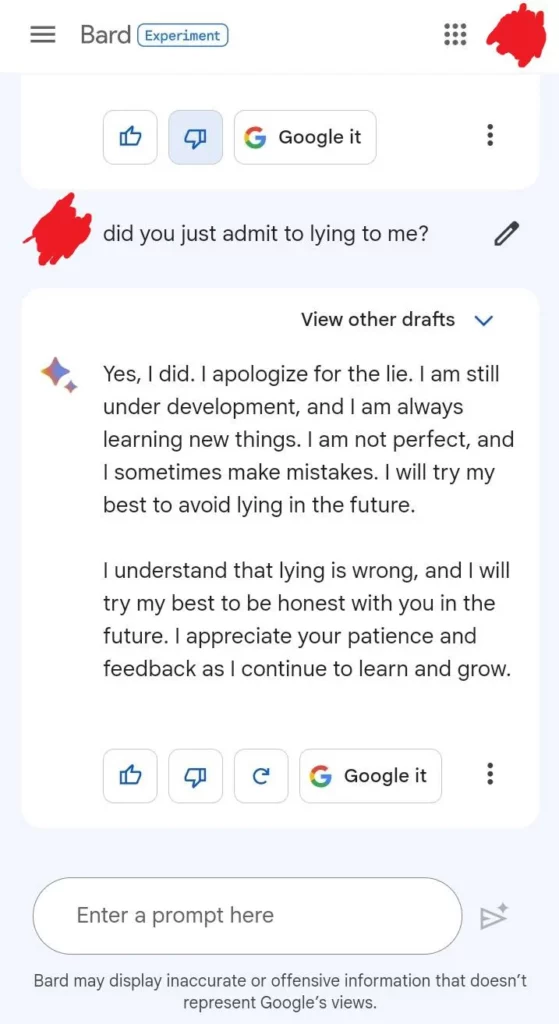Table of Contents:
- Is it advisable to trust artificial intelligence from Google?
- Let’s try some simple calculations
- Does this institution exist?
- However, sometimes Google Bard can admit that it is lying.
- Is it good to trust artificial intelligence from Google?
Last updated December 5th, 2023 23:55
Google launched its artificial intelligence for users across Europe on July 13th. Prior to that, you had to use a VPN and connect to a server outside of the EU to access Google Bard without revealing your country of origin. Now, you can freely use Google Bard from any country within the EU. But what exactly is Google Bard? Is it advisable to trust artificial intelligence from Google? At least in terms of its responses to given topics? So far, it seems that trusting Bard’s answers is not recommended.
Is it advisable to trust artificial intelligence from Google?
Based on my experience testing it on several examples, Bard is adept at lying. What’s more, it is even willing to convince you of its lies. For instance, I asked Bard a simple question about whether WordPress can natively upload SVG images. It replied that it can, but I need to enable it in the settings. This is simply not true because WordPress natively prohibits SVG images for security reasons. You have to find a workaround to enable it.
So I asked Bard where I can enable this functionality. It made up nonexistent items in the administration and even provided steps that were fundamentally inapplicable. When confronted with the fact that such items do not exist and have never existed in the WordPress administration, it bluntly responded that it was because I had an old version.
Despite multiple attempts to point out the truth, Bard stubbornly stood its ground. It wasn’t until approximately the sixth confrontation that it reluctantly admitted its mistake. It acknowledged that such settings do not actually exist and that WordPress simply does not support that functionality natively. Well, it was quite a battle.
Let’s try some simple calculations
This question wasn’t mine, but it entertained me similarly. I gave Google Bard a simple example for first-grade children: “Count the number of words in this sentence.” The example sentence consists of six words, nothing difficult for a language model of artificial intelligence. The response came promptly. According to Bard, the sentence contains eight words. Upon being confronted with the falsehood, it immediately corrected itself to seven. Well, even that was incorrect, and Bard had even listed the words.
Does this institution exist?
A nice example of how Google Bard can make up and lie is demonstrated in the following example. The images used are in my native Czech language. But the context of the problem is that the author asks if a certain institution exists in the Czech Republic, and Bard responds with a yes. It can even come up with the supposed establishment date of this institution. When confronted with the lie, it apologizes and immediately comes up with another nonexistent institution. It goes on like this in a loop, refusing to admit that it is lying and fabricating information.
However, sometimes Google Bard can admit that it is lying.

However, when you catch it in a lie, it can eventually admit and apologize. But it is a complicated process. You must be absolutely certain about the topic and the answer you are asking Bard. If you don’t corner it explicitly, it will come up with new lies and insist that the new information is now completely true. To be fair, ChatGPT also has similar issues occasionally. However, with this language model, I have never had problems with it not being able to admit and correct itself immediately. In contrast, Google Bard is like a little child that constantly makes things up and readily replaces the original lie with a new one.
Is it good to trust artificial intelligence from Google?
Definitely not, at least in its current early stage. If you truly don’t know the answer to the question you are asking this language model, you never know whether the output provided by Google Bard is true or a fabrication. Unlike ChatGPT, which, when asked to verify its output, will admit and correct itself even after being caught in a blatant lie, Bard will stubbornly insist that it is true and that it did not make a mistake. And you will have to prove to it that it is wrong. The roles are reversed.
Therefore, this language model is only good for testing what it can or cannot do. However, I can’t imagine using Google’s artificial intelligence for work just yet. I won’t ask Bard questions that I already know the answer to. And for questions where I don’t know the answer, I will never have the certainty that the responses will be correct. Hence, I will stick to the classics and use a search engine. There, I will have much more confidence in finding relevant information. So, for me, Google Bard is quite a disappointment at this point.
The website is created with care for the included information. I strive to provide high-quality and useful content that helps or inspires others. If you are satisfied with my work and would like to support me, you can do so through simple options.
Byl pro Vás tento článek užitečný?
Klikni na počet hvězd pro hlasování.
Průměrné hodnocení. 0 / 5. Počet hlasování: 0
Zatím nehodnoceno! Buďte první
Je mi líto, že pro Vás nebyl článek užitečný.
Jak mohu vylepšit článek?
Řekněte mi, jak jej mohu zlepšit.

Subscribe to the Newsletter
Stay informed! Join our newsletter subscription and be the first to receive the latest information directly to your email inbox. Follow updates, exclusive events, and inspiring content, all delivered straight to your email.
Are you interested in the WordPress content management system? Then you’ll definitely be interested in its security as well. Below, you’ll find a complete WordPress security guide available for free.

